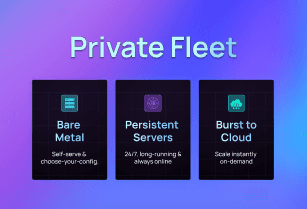
Pour le Multijoueur Parfait
Matchmaking et orchestration de serveurs de jeu sur la plus grande infrastructure edge publique au monde
Orchestration de serveurs de jeux automatisée et distribuée sur la plus grande infrastructure infonuagique publique au monde

Pour le Multijoueur Parfait
Serveurs de jeux automatisés & orchestration distribuée sur la plus grande infrastructure informatique décentralisée publique au monde
Intégrer Edgegap facilement en quelques minutes
Commencez l'intégration maintenant!
Commencez l'intégration maintenant!
Commencez l'intégration maintenant!

Utilisé par des centaines
de studios & développeurs de jeux
Halfbrick Studios
Edgegap nous aide à dépasser nos limites avec des vCPU hautement optimisés pour des coûts minimaux par serveur, une faible latence idéale pour la réalité virtuelle et une distribution mondiale instantanée pour atteindre un public mondial.

Georg Graf
Game Developer
Halfbrick Studios
Edgegap nous aide à dépasser nos limites avec des vCPU hautement optimisés pour des coûts minimaux par serveur, une faible latence idéale pour la réalité virtuelle et une distribution mondiale instantanée pour atteindre un public mondial.

Georg Graf
Game Developer
Halfbrick Studios
Edgegap nous aide à dépasser nos limites avec des vCPU hautement optimisés pour des coûts minimaux par serveur, une faible latence idéale pour la réalité virtuelle et une distribution mondiale instantanée pour atteindre un public mondial.

Georg Graf
Game Developer
Starbreeze AB
Edgegap nous donne la capacité de monter en puissance instantanément lors des pics et diminuer tout aussi rapidement en veillant à ce que nos coûts restent parfaitement en phase avec l'utilisation. C'est entièrement automatique, donc nous pouvons nous concentrer sur le jeu.

Mikael Eyewood
Release Manager
Starbreeze AB
Edgegap nous donne la capacité de monter en puissance instantanément lors des pics et diminuer tout aussi rapidement en veillant à ce que nos coûts restent parfaitement en phase avec l'utilisation. C'est entièrement automatique, donc nous pouvons nous concentrer sur le jeu.

Mikael Eyewood
Release Manager
Starbreeze AB
Edgegap nous donne la capacité de monter en puissance instantanément lors des pics et diminuer tout aussi rapidement en veillant à ce que nos coûts restent parfaitement en phase avec l'utilisation. C'est entièrement automatique, donc nous pouvons nous concentrer sur le jeu.

Mikael Eyewood
Release Manager
Star Atlas Studios
L'orchestration d'Edgegap nous aide à offrir la expérience en ligne AAA idéale que notre communauté attend pour nos matchs PvP.

Lukas Elsner
Infrastructure Architect
Star Atlas Studios
L'orchestration d'Edgegap nous aide à offrir la expérience en ligne AAA idéale que notre communauté attend pour nos matchs PvP.

Lukas Elsner
Infrastructure Architect
Star Atlas Studios
L'orchestration d'Edgegap nous aide à offrir la expérience en ligne AAA idéale que notre communauté attend pour nos matchs PvP.

Lukas Elsner
Infrastructure Architect
The Fun Pimps & iLLOGIKA
Grâce à la technologie performante d'Edgegap & un support exceptionnel, nous avons non seulement réduit considérablement nos coûts de serveur mais aussi posé les bases pour offrir l'expérience de jeu optimale que notre communauté attend de 7 Days Blood Moons.

David Fugere-Lamarre
Co-Founder & CEO
The Fun Pimps & iLLOGIKA
Grâce à la technologie performante d'Edgegap & un support exceptionnel, nous avons non seulement réduit considérablement nos coûts de serveur mais aussi posé les bases pour offrir l'expérience de jeu optimale que notre communauté attend de 7 Days Blood Moons.

David Fugere-Lamarre
Co-Founder & CEO
The Fun Pimps & iLLOGIKA
Grâce à la technologie performante d'Edgegap & un support exceptionnel, nous avons non seulement réduit considérablement nos coûts de serveur mais aussi posé les bases pour offrir l'expérience de jeu optimale que notre communauté attend de 7 Days Blood Moons.

David Fugere-Lamarre
Co-Founder & CEO
Combat Waffle Studios
Migrer vers Edgegap nous a aidés à optimiser les coûts des serveurs grâce à des prix compétitifs dans le cloud et à des remises sur engagement, tandis que son scalabilité automatisée nous a permis de nous concentrer sur le développement de jeux.

Jonas Deign
CTO
Combat Waffle Studios
Migrer vers Edgegap nous a aidés à optimiser les coûts des serveurs grâce à des prix compétitifs dans le cloud et à des remises sur engagement, tandis que son scalabilité automatisée nous a permis de nous concentrer sur le développement de jeux.

Jonas Deign
CTO
Combat Waffle Studios
Migrer vers Edgegap nous a aidés à optimiser les coûts des serveurs grâce à des prix compétitifs dans le cloud et à des remises sur engagement, tandis que son scalabilité automatisée nous a permis de nous concentrer sur le développement de jeux.

Jonas Deign
CTO
Halfbrick Studios
Les balises & faible latence d'Edgegap nous aident à ignorer les “régions classiques” et à connecter des joueurs à travers les pays, ce qui est incroyable!

Georg Graf
Game Developer
Halfbrick Studios
Les balises & faible latence d'Edgegap nous aident à ignorer les “régions classiques” et à connecter des joueurs à travers les pays, ce qui est incroyable!

Georg Graf
Game Developer
Halfbrick Studios
Les balises & faible latence d'Edgegap nous aident à ignorer les “régions classiques” et à connecter des joueurs à travers les pays, ce qui est incroyable!

Georg Graf
Game Developer
Blue Duck Studios
Edgegap a été un changement radical pour nous aider à offrir une expérience multijoueur F2P fluide et à grande échelle. L'équipe d'Edgegap a vraiment dépensé des efforts considérables pour nous soutenir.

Omer Simchoni
Co-Founder & CEO
Blue Duck Studios
Edgegap a été un changement radical pour nous aider à offrir une expérience multijoueur F2P fluide et à grande échelle. L'équipe d'Edgegap a vraiment dépensé des efforts considérables pour nous soutenir.

Omer Simchoni
Co-Founder & CEO
Blue Duck Studios
Edgegap a été un changement radical pour nous aider à offrir une expérience multijoueur F2P fluide et à grande échelle. L'équipe d'Edgegap a vraiment dépensé des efforts considérables pour nous soutenir.

Omer Simchoni
Co-Founder & CEO
Crater Studios
Edgegap nous a aidés à expédier plus rapidement, avec plus de confiance et avec beaucoup moins de friction. Nous les recommandons fortement à tout studio créant des expériences multijoueurs en ligne.

Amnon Israel
Co-Founder & CEO
Crater Studios
Edgegap nous a aidés à expédier plus rapidement, avec plus de confiance et avec beaucoup moins de friction. Nous les recommandons fortement à tout studio créant des expériences multijoueurs en ligne.

Amnon Israel
Co-Founder & CEO
Crater Studios
Edgegap nous a aidés à expédier plus rapidement, avec plus de confiance et avec beaucoup moins de friction. Nous les recommandons fortement à tout studio créant des expériences multijoueurs en ligne.

Amnon Israel
Co-Founder & CEO


Hébergement automatisé de serveurs de jeu pour un multijoueur sans faille
Performance d'orchestration
que seul Edgegap peut offrir
Performance d'orchestration
que seul Edgegap peut offrir
Nos plugins fonctionnes avec les principaux moteurs de jeu se chargent de mettre votre jeu en ligne, et notre intégration avec les principaux services de jeu accélère votre processus de développement
01.
Hébergement sans région
L'hébergement sans région d'Edgegap met en cache et déploie votre serveur de jeu dans le monde entier à la demande, dans ses plus de 615 emplacements.Distribuez instantanément votre jeu à un public mondial. Aucun SDK requis.
02.
Le déploiement idéal, à chaque fois
03.
Traditionnel est lent et sujet à des échecs
01.
Hébergement sans région
L'hébergement sans région d'Edgegap met en cache et déploie votre serveur de jeu dans le monde entier à la demande, dans ses plus de 615 emplacements.Distribuez instantanément votre jeu à un public mondial. Aucun SDK requis.
02.
Le déploiement idéal, à chaque fois
À la demande et juste à temps, notre orchestrateur breveté déploie immédiatement le meilleur serveur disponible. Réduit directement la latence jusqu'à 58 % pour les joueurs. Il évite également la nécessité de diviser votre base de joueurs dans votre système de matchmaking.
Edgegap
03.
Traditionnel est lent et sujet à des échecs
L'orchestration traditionnelle, à travers des centres de données centralisés, introduit une latence qui se traduit par un désengagement des joueurs.
Concurrent
01.
Hébergement sans région
L'hébergement sans région d'Edgegap met en cache et déploie votre serveur de jeu dans le monde entier à la demande, dans ses plus de 615 emplacements.Distribuez instantanément votre jeu à un public mondial. Aucun SDK requis.
02.
Le déploiement idéal, à chaque fois
03.
Traditionnel est lent et sujet à des échecs
Nous nous sommes assurés que c'est facile, simple & rapide
Nous nous sommes assurés que c'est facile, simple & rapide
Nous nous sommes assurés que c'est facile, simple & rapide
L'intégration prend quelques minutes
L'intégration prend quelques minutes
Notre intégration vous guidera à chaque étape du chemin.
Pas besoin d'intégrer des bibliothèques ou d'apprendre un nouveau produit.
Notre intégration vous guidera à chaque étape du chemin.
Pas besoin d'intégrer des bibliothèques ou d'apprendre un nouveau produit.
Intégrez avec votre flux de travail de développement AI
Connectez notre documentation complète à ChatGPT, Claude et d'autres assistants IA pour rendre l'implémentation de l'orchestration de serveurs de jeux et du matchmaking encore plus rapide et facile.
Edgegap fonctionne déjà avec vos outils préférés
Nos plugins fonctionnes avec les principaux moteurs de jeu se chargent de mettre votre jeu en ligne, et notre intégration avec les principaux services de jeu accélère votre processus de développement
Obtenez des réponses instantanées lorsque vous intégrez
Nous (évidemment) avons un chatbot IA formé sur notre documentation.
Obtenez une réponse immédiate à vos questions d'intégration, ainsi que notre support communautaire.
Nous avons (évidemment) un chatbot IA, formé sur notre documentation. Obtenez une réponse immédiate à vos questions d'intégration, ainsi qu'un soutien communautaire.
Toutes les fonctionnalités nécessaires pour chaque type de projet
Toutes les fonctionnalités nécessaires pour chaque type de projet


Économisez du temps et des ressources
Nous sommes des experts de l'hébergement de jeux et d'orchestration,
concentrez-vous sur ce que vous faites de mieux - le développement de jeux.
Payez seulement
quand les joueurs jouent
Vous ne payez que l'hébergement du serveur de jeu lorsque les joueurs jouent des parties en ligne.
Aucun engagement, ni de coût initial ou de frais mensuels fixes pour la location de serveurs. Il n'y a pas de coûts cachés masqués par des crédits gratuits.
Plus de capacité gaspillée
Notre plateforme s'adapte en fonction de la demande des joueurs, ce qui rend obsolète toute capacité coûteuse et inutilisée.
Dernières actualités

Le rapport de jeux en ligne
connectivité
Explorez l'expérience de jeu en ligne du point de vue du joueur ; comment les joueurs expérimentent-ils la connectivité et la latence, et son impact sur l'engagement & la rétention.

Le rapport de jeux en ligne
connectivité
Explorez l'expérience de jeu en ligne du point de vue du joueur ; comment les joueurs expérimentent-ils la connectivité et la latence, et son impact sur l'engagement & la rétention.

Le rapport de jeux en ligne
connectivité
Explorez l'expérience de jeu en ligne du point de vue du joueur ; comment les joueurs expérimentent-ils la connectivité et la latence, et son impact sur l'engagement & la rétention.


Partenaires

Solutions
©
2026
Edgegap. Tous droits réservés.

Solutions
©
2026
Edgegap. Tous droits réservés.

Solutions
©
2026
Edgegap. Tous droits réservés.
































































































































